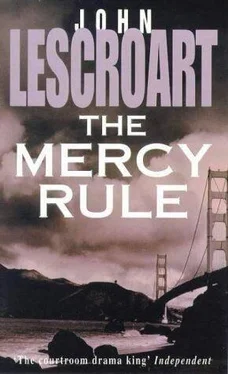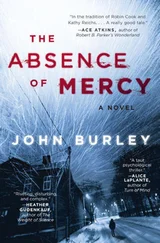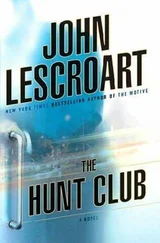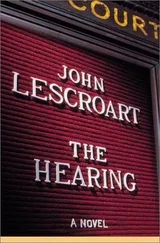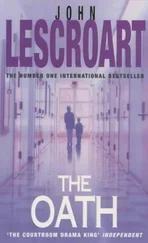John Lescroart - The Mercy Rule
Здесь есть возможность читать онлайн «John Lescroart - The Mercy Rule» весь текст электронной книги совершенно бесплатно (целиком полную версию без сокращений). В некоторых случаях можно слушать аудио, скачать через торрент в формате fb2 и присутствует краткое содержание. Жанр: Триллер, на английском языке. Описание произведения, (предисловие) а так же отзывы посетителей доступны на портале библиотеки ЛибКат.
- Название:The Mercy Rule
- Автор:
- Жанр:
- Год:неизвестен
- ISBN:нет данных
- Рейтинг книги:5 / 5. Голосов: 1
-
Избранное:Добавить в избранное
- Отзывы:
-
Ваша оценка:
- 100
- 1
- 2
- 3
- 4
- 5
The Mercy Rule: краткое содержание, описание и аннотация
Предлагаем к чтению аннотацию, описание, краткое содержание или предисловие (зависит от того, что написал сам автор книги «The Mercy Rule»). Если вы не нашли необходимую информацию о книге — напишите в комментариях, мы постараемся отыскать её.
The Mercy Rule — читать онлайн бесплатно полную книгу (весь текст) целиком
Ниже представлен текст книги, разбитый по страницам. Система сохранения места последней прочитанной страницы, позволяет с удобством читать онлайн бесплатно книгу «The Mercy Rule», без необходимости каждый раз заново искать на чём Вы остановились. Поставьте закладку, и сможете в любой момент перейти на страницу, на которой закончили чтение.
Интервал:
Закладка:
After that there were opportunities to get ‘not guilty’ verdicts for other clients, but this was not the same thing as the clients themselves being innocent.
Hardy wasn’t going to defend criminals and use his glib Irish tongue to get them off on legerdemain, on legal technicalities. He did not feel any kinship with criminals, and didn’t much care what societal influences had made them go bad. He didn’t want to help keep them out of jail, even if it put bread on his table. Not that he didn’t believe that defendants were entitled to the best defense the law allowed. Personally, though, he just wasn’t going to provide it.
So his professional life had devolved into estate planning, business contracts, litigation. Occasionally, he’d take a fee for walking a client through the administrative maze of a DUI or shoplifting charge.
He often dreamed of dropping the pretense altogether, go back to his bar and pour drinks full-time – but that was another problem. The world was a different place than it had been before the kids.
In those days he and Frannie felt rich. They had money in the bank. Hardy’s house was tiny but paid off. Every six months they got a profit-sharing check from the Shamrock in the five-thousand-dollar range that cleared their credit cards. He’d made some money on those first two murder cases. They’d been able to get by, comfortably, on three grand a month.
Now they needed nearly three times that. Home insurance, medical insurance, life insurance, saving for college (assuming his kids went), the loan payment for the house addition they’d built. Food, clothing, the occasional sortie into the nonchild world of restaurants and nightlife.
He couldn’t afford to stop working at the law. Loving what you did was a luxury he couldn’t permit himself anymore. Frannie was talking about going back to work next year when Vincent started first grade. This was an issue – they both knew she’d be lucky to break even on the day care they’d need.
Of course, there was a second option: she could go back to school in family counseling, incur another mound of debt, possibly position herself to make more money (‘In family counseling? Hardy would ask) so that in ten years…
This was the downsized American nineties. You tightened the belt and everybody pitched in and worked all the time and maybe someday your kids would have it only a little worse than you did now.
Hardy knew he wasn’t ever going back to his little bar where he could get by on tips. He was going to keep his nose at his desk and bill a hundred and fifty hours every month – which meant he actually worked two hundred – until he died.
Adulthood. He was developing a theory that it might be one of the country’s leading causes of death. Someone, he thought, ought to do a study.
Life was too short as it was. He wasn’t doing any more murder cases.
He did, however, follow Glitsky back across Bryant Street and into the familiar unpleasantness of the Hall of Justice, a huge, square, faceless, blue-gray monstrosity. Its address, seven increasingly depressing blocks south of Market, did not begin to convey the light-years of distance between the Hall and the sophisticated center of culture that it served.
Since Hardy’s last visit the huge glass-front doors had been backed by graffitied plywood – a less-than-inspired design solution, if part of the building’s visual statement was to make the citizenry feel safe. A cattle chute led through a metal detector into the lobby.
At the elevator banks, frothing with vulgarity, Glitsky was stopped by a young Hispanic man who started talking to him about a case. The kid seemed to be an assistant DA, as Hardy had once been. Had he been that young?
Hardy contemplated as the elevators came and went. The DA’s office had truly undergone a sea change if this youngster had made it to prosecuting homicides already. But he was talking to Glitsky, so that’s what it had to be about. Glitsky wasn’t exactly Mr Idle Chitchat.
Abe finally got around to introductions, pointing a finger around. ‘New guy, Eric Franco. Old guy, Dismas Hardy. Hardy doesn’t work here anymore. He’s moved on to greener pastures. Private practice. Franco’s got his first one eighty-seven’ – a murder case – ‘he’s a little nervous.’ From Glitsky this qualified as an oration.
The doors opened. The elevator was empty. They all moved. Eric took up the patter, at Hardy. ‘You on a homicide here, talking to the lieutenant?’
Hardy shook his head. ‘Social.’ Followed it with, ‘Hard to believe, I know.’
The doors opened on three and Hardy nearly got out from force of habit. This was the floor for the DA’s office, where he once had worked. Glitsky and the homicide detail were on four. When the doors closed on Franco, Hardy looked over at Glitsky. ‘How old is Eric?’
‘I don’t know. Twenty-five, thirty?’
‘And he’s pulled a murder?’
A shrug. ‘Probably a no-brainer.’
‘Still,’ Hardy persisted, ‘how many trials can he have done?’
The doors opened. ‘I don’t know, Diz. I didn’t hire him. The DA hired him. You want his resumé, it’s downstairs. Check it out.’ Without looking back he led the way down the hallway to the homicide detail.
Hardy followed, wondering how a man of Eric Franco’s age and experience could have been assigned to try a murder case in superior court and be expected to win even a no-brainer.
‘He’s not, is the simple answer,’ Glitsky said. ‘It’s politics.’
Hardy was standing in the doorless cubicle Glitsky used for an office. Outside in the detail, fourteen paired desks vied for floor space in the big open room. There were a couple of structural columns poking up here and there, festooned with wanted posters and yellowing memos, joined to watercoolers or coffee machines. Years before, forty square feet in the corner had been drywalled off and an ‘office’ created for the lieutenant. Some years after that the door had been removed for painting and never replaced.
Glitsky was behind his big, cluttered desk, catching up on paperwork. He’d had no objection to Hardy coming up to the detail to talk to inspectors Sarah Evans or Marcel Lanier – the Sal Russo investigating team – if they’d let him. If they didn’t want to talk, they wouldn’t be shy about letting him know. If they did, Hardy might get a hint about what Evans had found at the old fisherman’s apartment that had set off her warning bells: Sal might not have been a suicide.
But both inspectors had been out in the field, so Hardy went down to the bathroom, then wandered back into Glitsky’s space and asked again about the kid Franco and got told it was politics.
‘Losing trials is politics?’
‘You really ought to go down there’ – meaning the DA’s offices – ‘it’s a whole new world.’ Glitsky put down his report. ‘You’re not going to leave me alone, are you? Let me get back to my work?’
Hardy clucked. ‘I want to. I really do. I’m trying, even.’
‘I’m confident you can do it.’ The lieutenant picked up his report again. ‘Get the door on the way out, would you?’
David Freeman was in his trademark brown rumpled suit and wrinkled rep tie. Sitting in the low leather couch in Hardy’s office, smoking a cigar, his tattered brogues crossed over the rattan-and-glass coffee table, Freeman, the wealthy, famous landlord of the building, could have been mistaken for a destitute client. The man was retirement age or better, and sported tufts of white hair from the tops of his earlobes and eyebrows. Bald on top, round in the middle, liver spots wherever skin showed, he was still a force in the courtrooms of the city.
‘The reason it’s politics,’ he was saying – Hardy had worried it all the way back to his office – ‘is Sharron Pratt, our esteemed DA.’
Читать дальшеИнтервал:
Закладка:
Похожие книги на «The Mercy Rule»
Представляем Вашему вниманию похожие книги на «The Mercy Rule» списком для выбора. Мы отобрали схожую по названию и смыслу литературу в надежде предоставить читателям больше вариантов отыскать новые, интересные, ещё непрочитанные произведения.
Обсуждение, отзывы о книге «The Mercy Rule» и просто собственные мнения читателей. Оставьте ваши комментарии, напишите, что Вы думаете о произведении, его смысле или главных героях. Укажите что конкретно понравилось, а что нет, и почему Вы так считаете.
